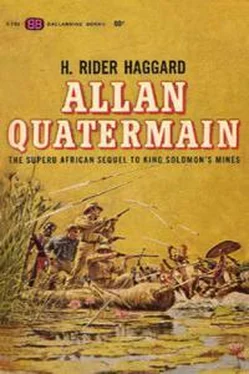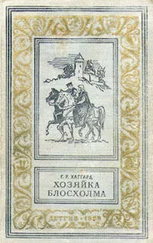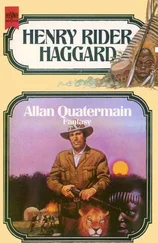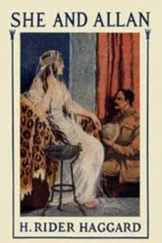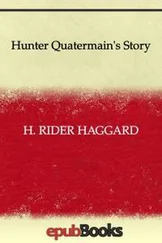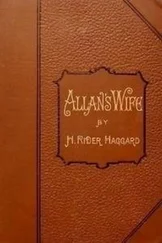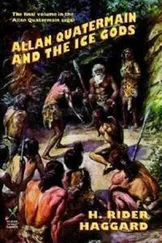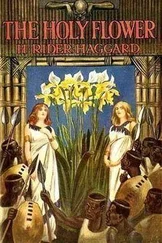'Was the child alive?' asked Mr Mackenzie, hoarsely.
'She was white as the snow, but well, my father. They passed quite close to me, and looking up from where I lay hid I saw her face against the sky.'
'God help her and us!' groaned the clergyman.
'How many are there of them?' I asked.
'More than two hundred—two hundred and half a hundred.'
Once more we looked one on the other. What was to be done? Just then there rose a loud insistent cry outside the wall.
'Open the door, white man; open the door! A herald—a herald to speak with thee.' Thus cried the voice.
Umslopogaas ran to the wall, and, reaching with his long arms to the coping, lifted his head above it and gazed over.
'I see but one man,' he said. 'He is armed, and carries a basket in his hand.'
'Open the door,' I said. 'Umslopogaas, take thine axe and stand thereby. Let one man pass. If another follows, slay.'
The door was unbarred. In the shadow of the wall stood Umslopogaas, his axe raised above his head to strike. Just then the moon came out. There was a moment's pause, and then in stalked a Masai Elmoran, clad in the full war panoply that I have already described, but bearing a large basket in his hand. The moonlight shone bright upon his great spear as he walked. He was physically a splendid man, apparently about thirty–five years of age. Indeed, none of the Masai that I saw were under six feet high, though mostly quite young. When he got opposite to us he halted, put down the basket, and stuck the spike of his spear into the ground, so that it stood upright.
'Let us talk,' he said. 'The first messenger we sent to you could not talk;' and he pointed to the head which lay upon the paving of the stoep—a ghastly sight in the moonlight; 'but I have words to speak if ye have ears to hear. Also I bring presents;' and he pointed to the basket and laughed with an air of swaggering insolence that is perfectly indescribable, and yet which one could not but admire, seeing that he was surrounded by enemies.
'Say on,' said Mr Mackenzie.
'I am the "Lygonani" [war captain] of a party of the Masai of the Guasa Amboni. I and my men followed these three white men,' and he pointed to Sir Henry, Good, and myself, 'but they were too clever for us, and escaped hither. We have a quarrel with them, and are going to kill them.'
'Are you, my friend?' said I to myself.
'In following these men we this morning caught two black men, one black woman, a white donkey, and a white girl. One of the black men we killed—there is his head upon the pavement; the other ran away. The black woman, the little white girl, and the white ass we took and brought with us. In proof thereof have I brought this basket that she carried. Is it not thy daughter's basket?'
Mr Mackenzie nodded, and the warrior went on.
'Good! With thee and thy daughter we have no quarrel, nor do we wish to harm thee, save as to thy cattle, which we have already gathered, two hundred and forty head—a beast for every man's father.' [6] The Masai Elmoran or young warriors can own no property, so all the booty they may win in battle belongs to their fathers alone.—A. Q.
Here Mr Mackenzie gave a groan, as he greatly valued this herd of cattle, which he bred with much care and trouble.
'So, save for the cattle, thou mayst go free; more especially,' he added frankly, glancing at the wall, 'as this place would be a difficult one to take. But as to these men it is otherwise; we have followed them for nights and days, and must kill them. Were we to return to our kraal without having done so, all the girls would make a mock of us. So, however troublesome it may be, they must die.
'Now I have a proposition for thee. We would not harm the little girl; she is too fair to harm, and has besides a brave spirit. Give us one of these three men—a life for a life—and we will let her go, and throw in the black woman with her also. This is a fair offer, white man. We ask but for one, not for the three; we must take another opportunity to kill the other two. I do not even pick my man, though I should prefer the big one,' pointing to Sir Henry; 'he looks strong, and would die more slowly.'
'And if I say I will not yield the man?' said Mr Mackenzie.
'Nay, say not so, white man,' answered the Masai, 'for then thy daughter dies at dawn, and the woman with her says thou hast no other child. Were she older I would take her for a servant; but as she is so young I will slay her with my own hand—ay, with this very spear. Thou canst come and see, an' thou wilt. I give thee a safe conduct;' and the fiend laughed aloud as his brutal jest.
Meanwhile I had been thinking rapidly, as one does in emergencies, and had come to the conclusion that I would exchange myself against Flossie. I scarcely like to mention the matter for fear it should be misunderstood. Pray do not let any one be misled into thinking that there was anything heroic about this, or any such nonsense. It was merely a matter of common sense and common justice. My life was an old and worthless one, hers was young and valuable. Her death would pretty well kill her father and mother also, whilst nobody would be much the worse for mine; indeed, several charitable institutions would have cause to rejoice thereat. It was indirectly through me that the dear little girl was in her present position. Lastly, a man was better fitted to meet death in such a peculiarly awful form than a sweet young girl. Not, however, that I meant to let these gentry torture me to death—I am far too much of a coward to allow that, being naturally a timid man; my plan was to see the girl safely exchanged and then to shoot myself, trusting that the Almighty would take the peculiar circumstances of the case into consideration and pardon the act. All this and more went through my mind in very few seconds.
'All right, Mackenzie,' I said, 'you can tell the man that I will exchange myself against Flossie, only I stipulate that she shall be safely in this house before they kill me.'
'Eh?' said Sir Henry and Good simultaneously. 'That you don't.'
'No, no,' said Mr Mackenzie. 'I will have no man's blood upon my hands. If it please God that my daughter should die this awful death, His will be done. You are a brave man (which I am not by any means) and a noble man, Quatermain, but you shall not go.'
'If nothing else turns up I shall go,' I said decidedly.
'This is an important matter,' said Mackenzie, addressing the Lygonani, 'and we must think it over. You shall have our answer at dawn.'
'Very well, white man,' answered the savage indifferently; 'only remember if thy answer is late thy little white bud will never grow into a flower, that is all, for I shall cut it with this,' and he touched the spear. 'I should have thought that thou wouldst play a trick and attack us at night, but I know from the woman with the girl that your men are down at the coast, and that thou hast but twenty men here. It is not wise, white man,' he added with a laugh, 'to keep so small a garrison for your "boma" [kraal]. Well, good night, and good night to you also, other white men, whose eyelids I shall soon close once and for all. At dawn thou wilt bring me word. If not, remember it shall be as I have said.' Then turning to Umslopogaas, who had all the while been standing behind him and shepherding him as it were, 'Open the door for me, fellow, quick now.'
This was too much for the old chief's patience. For the last ten minutes his lips had been, figuratively speaking, positively watering over the Masai Lygonani, and this he could not stand. Placing his long hand on the Elmoran's shoulder he gripped it and gave him such a twist as brought him face to face with himself. Then, thrusting his fierce countenance to within a few inches of the Masai's evil feather–framed features, he said in a low growling voice:—
Читать дальше
